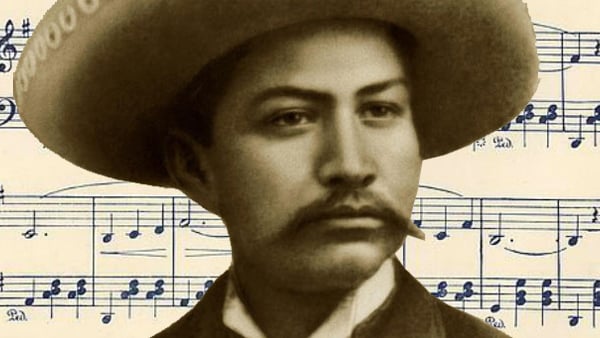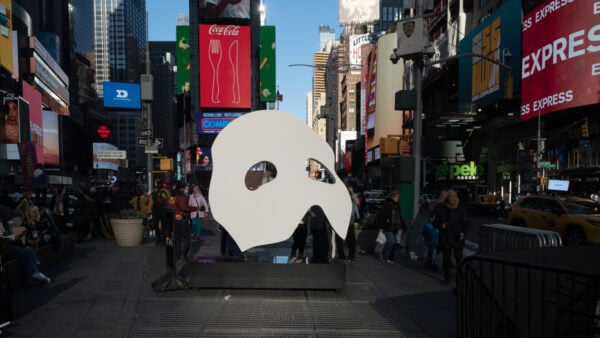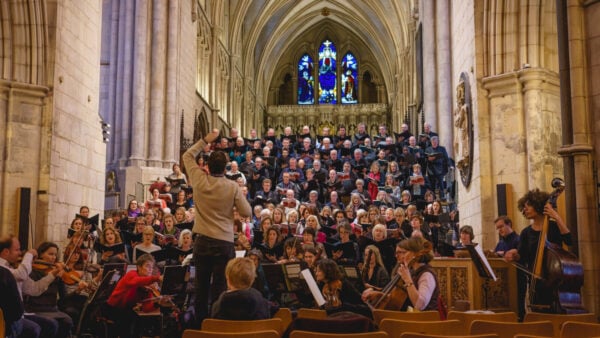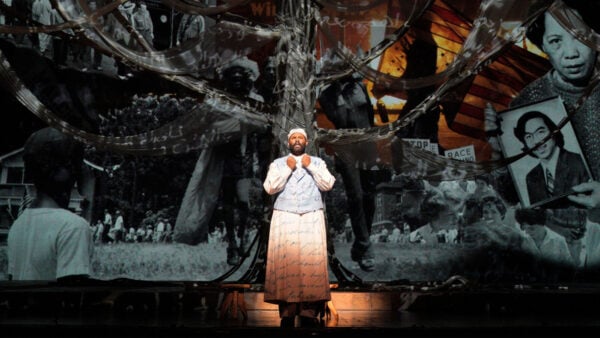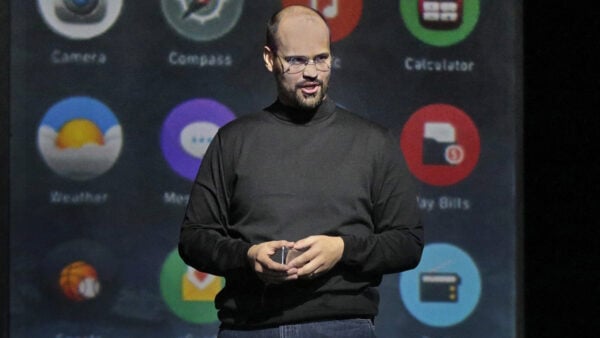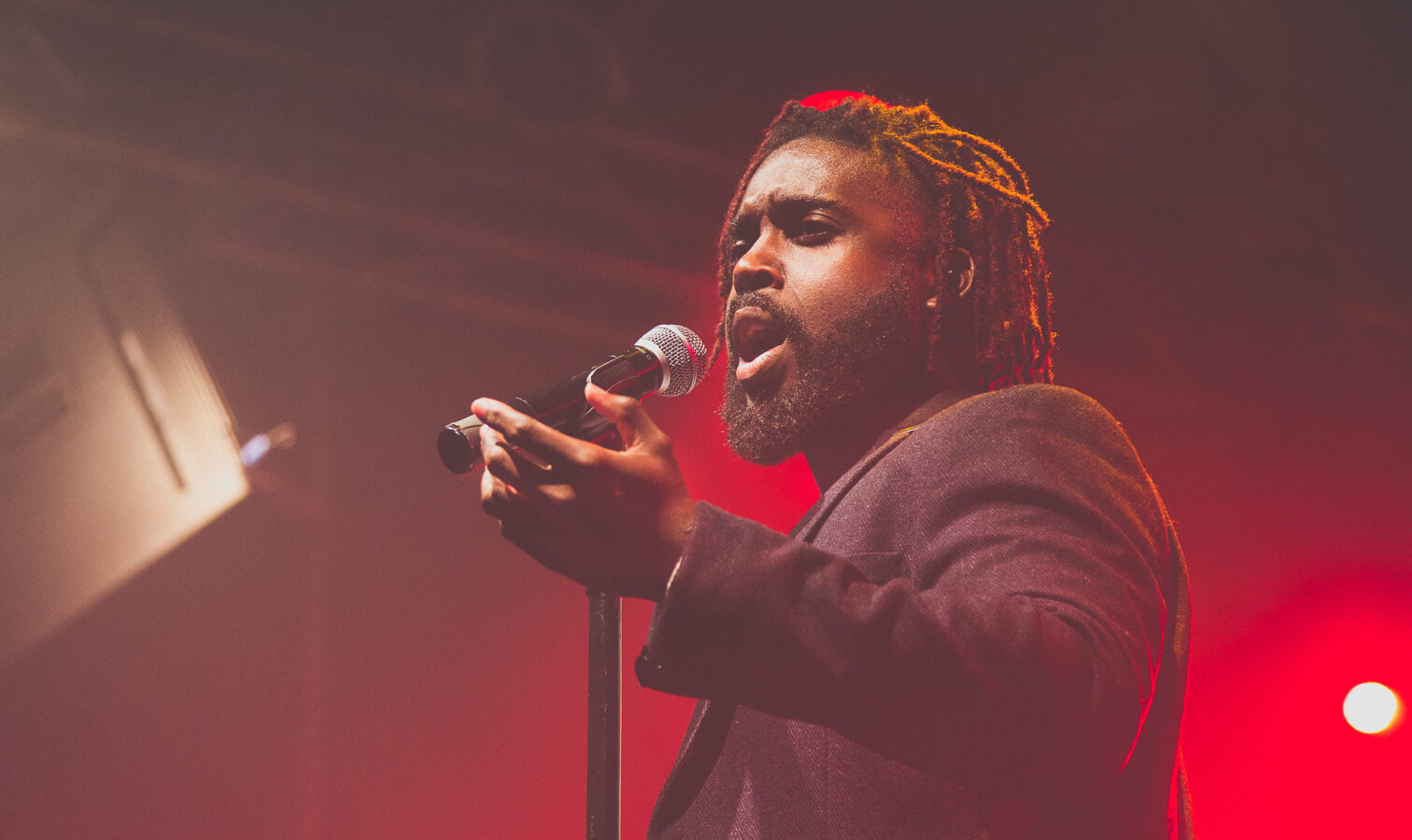
Mykal Kilgore performs at Broadway Sings at Whitney Houston in 2015
Mykal Kilgore has won critical acclaim for his performances on Broadway, in shows like Motown the Musical and Hair, as well as his work as a guest singer with Postmodern Jukebox. He lit the internet on fire when he set the words of Congresswoman Maxine Waters to song with his “Reclaiming My Time – Gospel Mix.” Now he’s bringing audiences to their feet in an Olivier Award-winning production of Jesus Christ Superstar, with performances at Lyric Opera of Chicago through May 20, 2018. Before a matinee performance of Andrew Lloyd Webber’s beloved rock opera, Kilgore spoke backstage about his training as an opera singer, how he uses his voice to raise awareness about important issues, and what it was like singing live for Auntie Maxine.
Kilgore got his start singing in church. “I’m the child of a pastor, so I spent a lot of time singing gospel in church. I didn’t start singing in school till I was a freshman in high school. About halfway through the year someone heard me sing and they said, ‘Why aren’t you in choir?’ So I started singing in choir and pretty soon after I decided that I wanted to go to college for voice. I started focusing more on classical vocal training in preparation for that.”
As a student at Florida State University, he earned a B.A. in classical voice, “but I also played tuba all the way through my schooling,” he said. “I have to give a lot of credit for my love of opera to a friend of mine, Antonio Cuyler, whom I met my freshman year of college,” he said. “I started dating him and immediately fell in love, and discovered that he was the smartest man on the planet. I fell in love with opera because of him.”
Though love may have helped Kilgore find his love of opera, he also attributes some of his affinity for the art form to the music he grew up with: gospel. “In the black church music is such an emotional, dramatic experience, and all the stories are taken from the biblical canon, so there are many different settings of the same text. That made for an easy transition into the world of classical voice because I started out as a choir person; we were doing requiems and masses and that was really easy and familiar for me. I also loved the idea of getting to be still in a moment that arias bring. The idea of getting to explore an emotion for an extended amount of time is something that I could transfer into the classical world because it is very similar to what I would do as a musical worship leader, we would just sort of bask in a moment in worship.”
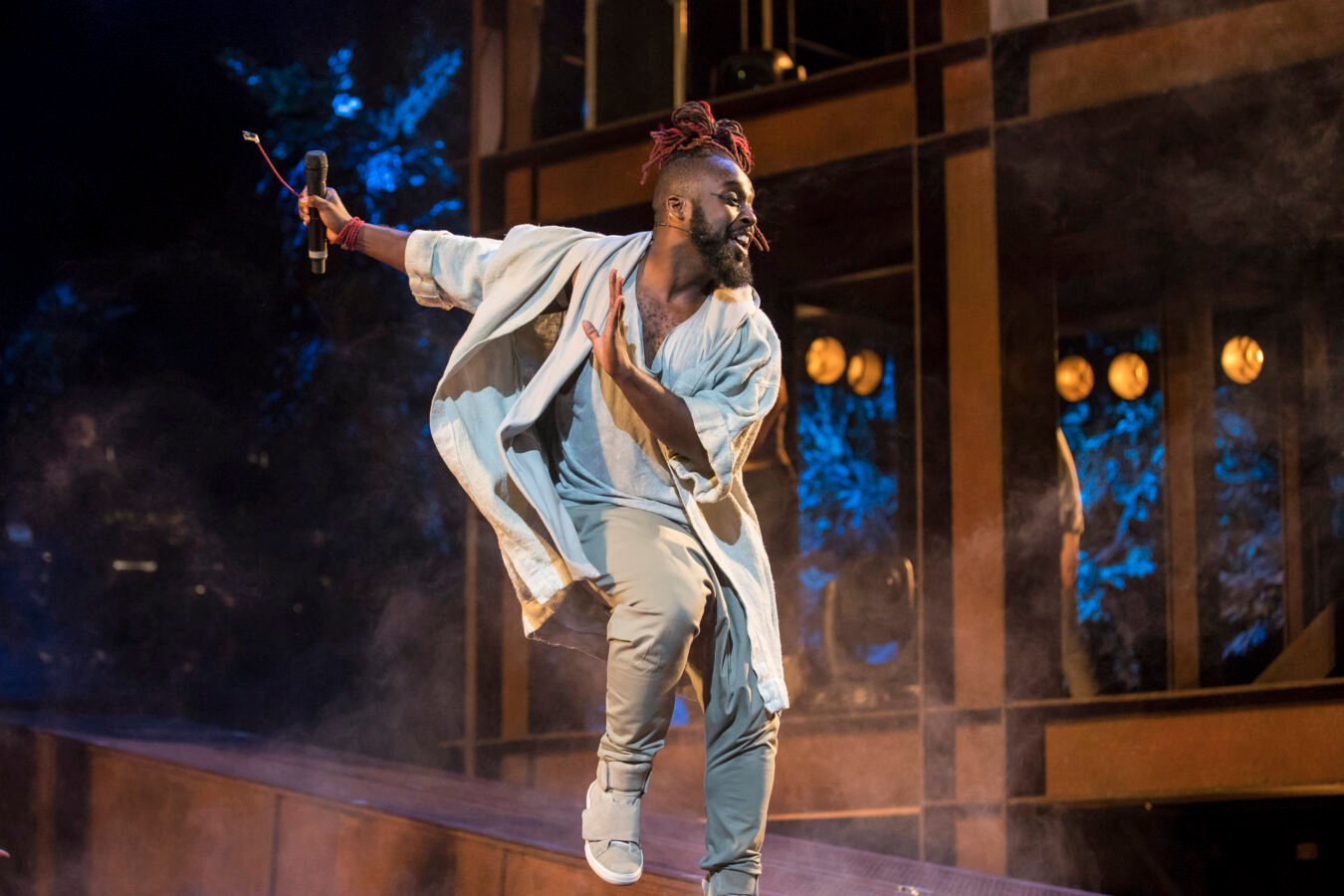
Mykal Kilgore in a dress rehearsal for Jesus Christ Superstar at Lyric Opera of Chicago (Photo: Todd Rosenberg)
Some of his favorite operatic works are by modern and contemporary composers, and Americans in particular. “I love American opera. I really fell for it while I was at Florida State because I found out that Susannah was written while Carlisle Floyd was there, so that’s one of my favorites. I also love The Rake’s Progress, dream roles would be Tom Rakewell and Baba the Turk. I love The Consul which I got the chance to do when I was in college. I think André Previn’s A Streetcar Named Desire is just spectacular. Of course, Porgy and Bess, it’s a standard, and lately, I’ve been into Nixon in China. That show is really opening up my writing and opening up my brain to all sorts of new things.”
Given Kilgore’s taste in operas, it may come as no surprise, then, that one of his favorite singers is Renée Fleming, who played Blanche DuBois in the premiere production of Streetcar, and is known for her rendition of “Ain’t it a pretty night?” from Susannah. He also admires Lawrence Brownlee, René Pape, Ian Bostridge, Fritz Wunderlich, and, “of course, Leontyne Price: the doors that she was able to burst open are astonishing.”
Kilgore admires other artists who are using their voices to break down barriers and raise awareness about important issues. “This is a really special time in history to see the art of African American people, and people of color in general, because we understand the urgency of getting our voices out there,” he said. “I would say Kendrick Lamar is doing a great job, he is in your face. Beyoncé is doing an amazing job because she has such a pop-culture stronghold that whenever she does something that is highlighting the culture, it’s really spectacular.” He also draws inspiration from Patti LaBelle, whom he calls “my favorite artist of all time, the most naturally gifted,” as well as Donny Hathaway and the Clark Sisters, the Grammy Award-winning gospel quintet from Detroit.
And he couldn’t forget to mention his love of Céline Dion, whose image he happened to be proudly wearing on a t-shirt. In fact, his rendition of Céline Dion’s “My Heart Will Go On”, which he recorded with Postmodern Jukebox, caught the attention of Titanic star Kate Winslet and Céline herself. He’s also recorded other hit songs with the group, including a cover of Whitney Houston’s “Greatest Love of All” reimagined into what he described as “this African American, golden era of jazz style.”
“I try to go into every song like an actor,” he explained. “When I cover a song I either do things that are epic, or things that are completely obscure. So when I did 'My Heart Will Go On,' I wasn’t trying to add any Célineisms, I was more trying to capture the style. But when I do covers of artists like Stevie Wonder, I don’t think as much about the artist as I do the style of how they sing, and I always try to sprinkle the truth of who I am into it.”
Kilgore sprinkles a little truth into the original music that he creates. After Congresswoman Maxine Waters famously repeated the phrase, “I’m reclaiming my time” in a heated conversation during a House Financial Services Committee hearing, the phrase went viral, and Kilgore decided to set her words to music. His “Reclaiming My Time – Gospel Mix,” which features six recordings of Kilgore singing in harmony with himself, became a viral sensation in its own right. “I could take a sentence you just said and turn it into a song – I just think in that way,” Kilgore said. (And that’s no joke – a half dozen times during the interview, he responded in mellifluous melody, rather than plain speech.)
“Something about ‘reclaiming my time’ felt musical, and then it came to be,” he explained. In about fifteen minutes, he composed and recorded the entire short track. “Almost everything that I do starts out as a gospel song, like something you would hear at church, so the style of the song sort of started out as a joke. I thought, I’ll post this, my friends will get a giggle, and that’ll be it. I posted the video, and two hours later it had gone viral.”
Later, Kilgore had the opportunity to perform his piece for Auntie Maxine on The View. He said their encounter was brief but powerful. “She thanked me, and I thanked her. She squeezed my hand really tight, and I squeezed right back just to let her know that if she ever feels like the wind isn’t at her back, we are at her back and we support her.”
“I feel a responsibility to myself and my community because I have a reach that is larger than most of the people that I grew up with. In my work I speak first and foremost for myself, but I also speak for the people whom I’ve loved, and who have loved me, and to whom I have a responsibility. Black American art is American art, and I want always to be a voice of representation in the breadth of what American art is. My space in that landscape is just as important as any other person’s. That is something my heroes and my family and friends have always been doing, so that’s why I’m so unafraid and unashamed of sharing my art.”

